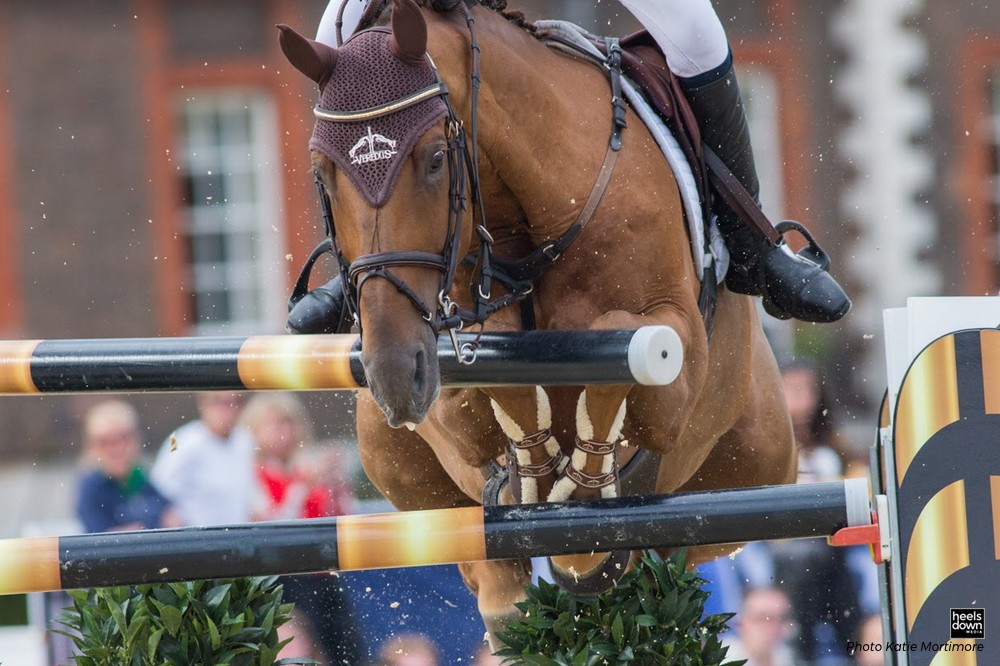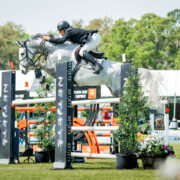Has Your Horse Hit His Limit?

The mental and physical indicators of overfacing your horse.
Over the course of a horse’s training, it is natural for him to feel challenged at times. After all, that’s how both horses and riders develop to their full potential. But what happens when a horse is pushed too hard or too fast and the pressure becomes too much?
The Behavioral Backlash
According to Olympic eventer Kelli Temple, who has developed hundreds of horses through the levels of eventing, the signs that a horse is feeling overfaced can range in magnitude and overtness.
“Of course the first indication of being overfaced (in jumping) would be stopping. But there can be more subtle indications as well,” she said. “Jumping left or right, adding strides, over jumping, even bolting or becoming quick in the approach or quick over the fence.”
“On the flat, indications of stress can be as small as teeth grinding or as large as napping, rearing or refusing to go forward,” added Kelli of Round Hill, Va., who has developed horses for the Olympics, World Games and to the CCI5* level.
These problems arise when a horse is asked to go beyond his physical capability, or when he becomes mentally overwhelmed. And, as Kelli explains, the two do not necessarily align – a horse can be plenty fit and physically capable of a task but lack confidence. Or a horse could be short on the scope, conditioning, or strength to carry out the rider’s request.
“When a horse is mentally overfaced they tend to show it through a change in temperament. But it can also show in more subtle ways like weight loss or loss of condition,” she explained.
“When a horse is physically overfaced he might still try to do what is asked but come up with ways to lessen the overwhelming effort. Examples would be twisting when jumping or becoming crooked in collected work. When you repeatedly physically overface a horse you will eventually cause some sort of soreness or lameness.”
“The less knowledgeable and diligent the rider or trainer are, the more likely it is to culminate in a catastrophic injury or a big behavioral meltdown.”
When these issues arise, is it best to bump down a level to lessen the pressure, or stay the course patiently and wait for the horse to adjust? It depends on the amount of anxiety and resistance, says Kelli.
“Here is where a good trainer would be helpful to give you an opinion from the ground. Sometimes a rider needs to kind of ‘push through’ these resistances and be a firm leader. But most often it’s best to make the question easier or less complex so that the horse can gain his confidence back.”
The Physical Evidence
A few of the common physical problems that arise include back soreness often in the lumbar area, sore haunches, and chronic hip pain, explains Dr. Courtney Culbertson, an equine veterinarian in Charleston, S.C. When these issues crop up, the physical soreness can be treated, but just as importantly, the horse should be given a break.
“There’s usually a period of having to start over a little bit – not all the way back to the beginning, but if the horse is needing [joint] injections or acupuncture or chiropractic care, you usually have to bring them back for a bit and can’t keep going at that level.”
Sometimes, pushing a horse too far can have significant consequences – like a major injury.
“I have seen a lot of horses that will start stopping at horse shows towards the end of the weekend when they’re being overworked, and then they present with a soft tissue injury three days later,” she said. “A lot of times the horse is trying to protect himself and won’t be obviously lame until they’re not running on adrenaline at the horse show.”
The ability of the rider or trainer to recognize the issue typically determines the course of events. If behavioral indicators or soreness are caught early on, modifications to the horse’s work level or schedule can be made.
“The less knowledgeable and diligent the rider or trainer are, the more likely it is to culminate in a catastrophic injury or a big behavioral meltdown,” said Dr. Culbertson. “But as you start to pick it apart, you realize that this horse probably needed the pressure backed off some time ago.”


